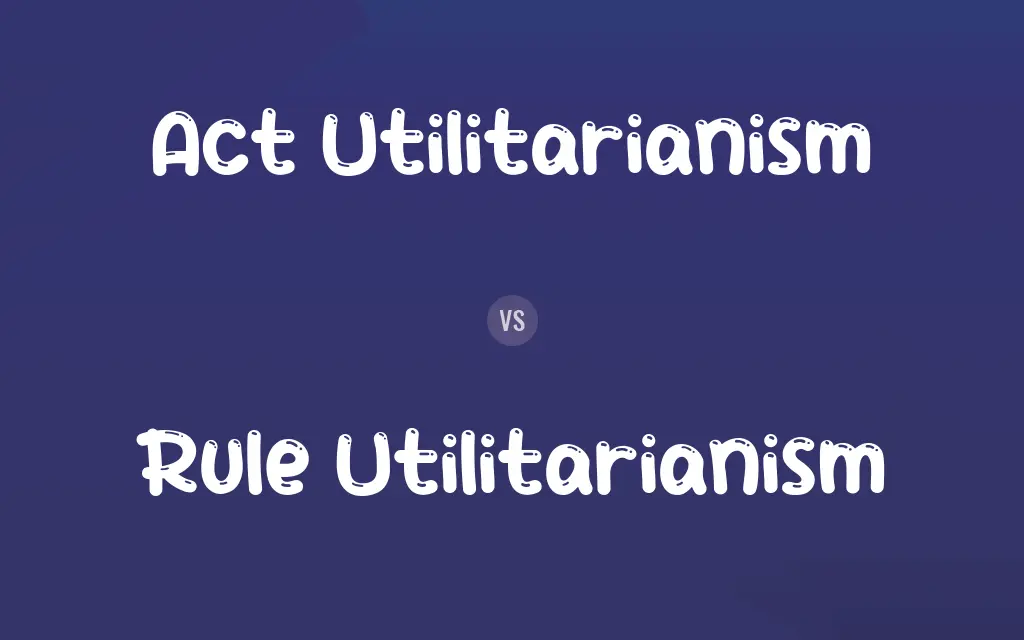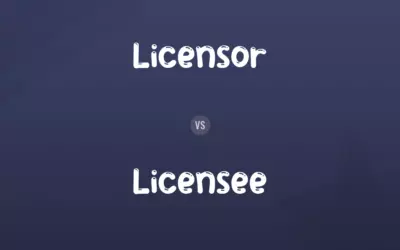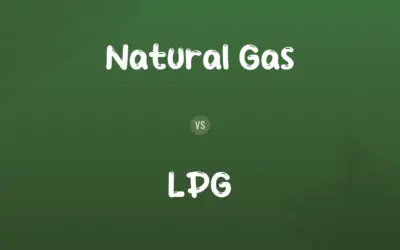Act Utilitarianism vs. Rule Utilitarianism: Difference and Comparison
Edited by Muazma Batool — By Muneeza Rehman — Published on November 26, 2023
Act utilitarianism assesses each action individually for maximum good, while rule utilitarianism focuses on rules that, when followed, produce the greatest overall happiness.

Difference Between Act Utilitarianism and Rule Utilitarianism
Act utilitarianism and rule utilitarianism are both subsets of the ethical theory of utilitarianism, which asserts that actions are morally right if they maximize happiness or pleasure for the greatest number of people. Act utilitarianism evaluates the consequences of each individual action, determining its moral worth based on the amount of happiness or pleasure it generates. In contrast, rule utilitarianism doesn't evaluate individual actions, but rather the rules governing those actions. If a rule generally produces the greatest happiness when followed, then it's considered morally right by this standard.
Muneeza Rehman
Nov 26, 2023
However, the nuances between act utilitarianism and rule utilitarianism can lead to different moral conclusions in certain situations. For instance, an act utilitarian might deem lying in a particular situation as morally right if it results in more overall happiness, even if it's just for that one instance. On the other hand, a rule utilitarian would consider whether allowing lying as a general rule would maximize happiness. If lying generally leads to mistrust and unhappiness, then lying would be deemed wrong, regardless of individual instances where it might increase happiness.
Muazma Batool
Nov 26, 2023
The appeal of act utilitarianism lies in its flexibility and case-by-case approach, allowing it to accommodate specific circumstances. However, this flexibility can be a double-edged sword, potentially justifying actions that are intuitively or traditionally deemed wrong. Rule utilitarianism offers a more stable and predictable ethical system, as it emphasizes consistent rules that society can follow. Yet, its critics argue that this approach can be too rigid, potentially failing to maximize happiness in individual situations.
Muneeza Rehman
Nov 26, 2023
In summary, while both act utilitarianism and rule utilitarianism aim to maximize overall happiness or pleasure, they differ in their methods. Act utilitarianism focuses on the outcomes of individual actions, while rule utilitarianism emphasizes the long-term consequences of rules or principles.
Kaitlyn
Nov 26, 2023
Act Utilitarianism vs. Rule Utilitarianism Comparison Chart
Assessment
Based on specific situation's outcome
Based on outcome if rule is consistently applied
Muazma Batool
Nov 26, 2023
Criticism
Can justify traditionally wrong actions
May be too rigid in unique situations
Kaitlyn
Nov 26, 2023
Act Utilitarianism vs. Rule Utilitarianism Definitions
◉Act Utilitarianism
A form of utilitarianism focusing on the outcomes of individual actions.
Under act utilitarianism, stealing could be justified if it results in greater overall good.
Muazma Batool
Sep 25, 2023
◉Rule Utilitarianism
An ethical theory emphasizing rules that maximize general happiness.
Rule utilitarianism would disapprove of lying as it erodes trust in society.
Muneeza Rehman
Sep 25, 2023
◉Act Utilitarianism
A flexible utilitarian approach considering each scenario uniquely.
In act utilitarianism, actions are morally fluid based on specific outcomes.
Muneeza Rehman
Sep 25, 2023
◉Rule Utilitarianism
A principle-based approach to utilitarian ethics.
Even if breaking a promise seems good now, rule utilitarianism considers the broader implications.
Kaitlyn
Sep 25, 2023
◉Act Utilitarianism
The idea that an action's morality is judged by its specific consequences.
Act utilitarianism might approve of breaking a promise if it leads to a happier result.
Kaitlyn
Sep 25, 2023
◉Rule Utilitarianism
The belief that consistent rules lead to the greatest overall utility.
Rule utilitarianism suggests stealing is wrong, as a society of theft doesn't maximize happiness.
Muneeza Rehman
Sep 25, 2023
◉Act Utilitarianism
The belief that the rightness of an act depends on its direct outcomes.
If saving a life requires deception, act utilitarianism may deem it moral.
Muneeza Rehman
Sep 25, 2023
◉Rule Utilitarianism
An approach where the morality of actions is based on rule-driven outcomes.
If a rule generally promotes happiness, rule utilitarianism upholds it, regardless of individual exceptions.
Muneeza Rehman
Sep 25, 2023
◉Act Utilitarianism
An ethical theory that evaluates each action's utility in producing happiness.
Lying might be acceptable in act utilitarianism if it maximizes happiness in a given situation.
Muneeza Rehman
Sep 25, 2023
◉Rule Utilitarianism
A form of utilitarianism that promotes rules producing the greatest good.
Under rule utilitarianism, actions align with established moral rules.
Muazma Batool
Sep 25, 2023
Act Utilitarianism vs. Rule Utilitarianism Frequently Asked Questions
Can act utilitarianism justify actions that seem morally wrong?
Yes, if the action in a specific situation produces the greatest happiness, act utilitarianism may justify it.
Muneeza Rehman
Nov 26, 2023
Which is more flexible between act utilitarianism and rule utilitarianism?
Act utilitarianism is more flexible, evaluating each situation individually.
Elijah
Nov 26, 2023
What does rule utilitarianism emphasize?
Rule utilitarianism emphasizes following rules that, when consistently applied, result in the greatest overall happiness.
Muazma Batool
Nov 26, 2023
How does rule utilitarianism handle exceptions?
Rule utilitarianism focuses on the overall utility of rules, not on individual exceptions.
Muneeza Rehman
Nov 26, 2023
Is rule utilitarianism always rigid in its approach?
While rule utilitarianism emphasizes consistency, there can be debates over which rules maximize overall happiness.
Kaitlyn
Nov 26, 2023
How do both forms of utilitarianism relate to the broader utilitarian philosophy?
Both aim to maximize happiness or pleasure, but differ in their approach to achieving this goal.
Muneeza Rehman
Nov 26, 2023
What is the primary goal of act utilitarianism?
Act utilitarianism aims to maximize happiness or pleasure based on the outcomes of individual actions.
Muneeza Rehman
Nov 26, 2023
Why might someone prefer rule utilitarianism over act utilitarianism?
For its predictability and emphasis on consistent moral rules.
Muneeza Rehman
Nov 26, 2023
In what situations might act utilitarianism be preferred?
In complex scenarios where a rigid rule might not maximize overall happiness.
Jonathan
Nov 26, 2023
Can the two theories reach different moral conclusions in the same scenario?
Yes, depending on the scenario, act and rule utilitarianism might recommend different actions.
Lucas
Nov 26, 2023
Content Creators
Written by
Muneeza RehmanAt Comparisons.wiki, Muneeza skillfully navigates the vast sea of information, ensuring clarity and accuracy as the lead content editor. With a keen eye for detail, she curates every comparison to enlighten and engage readers.
Edited by
Muazma BatoolAs a content editor, Muazma Batool is not just a grammar guru but a creative mastermind who breathes life into every word. With an eagle eye for detail and a passion for storytelling, she transforms bland text into engaging content that captivates audiences and drives results.





























